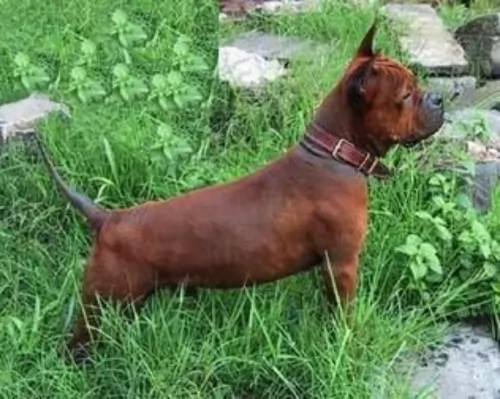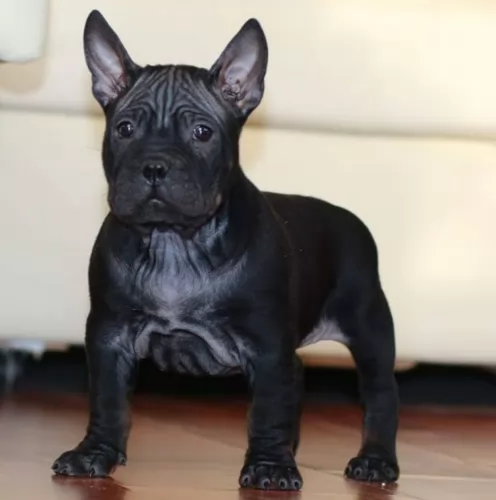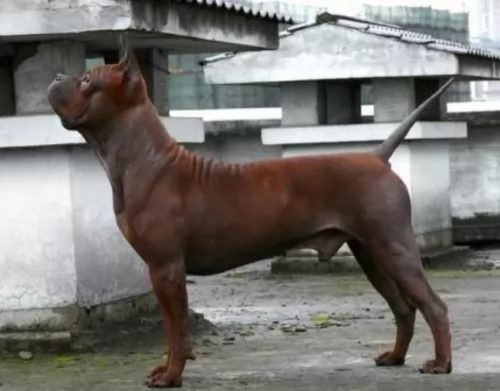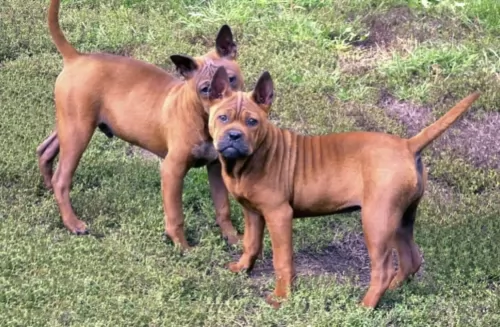 Petzlover
PetzloverAmerican Molossus is originated from United States but Chinese Chongqing Dog is originated from China. American Molossus may grow 18 cm / 8 inches higher than Chinese Chongqing Dog. American Molossus may weigh 24 kg / 53 pounds more than Chinese Chongqing Dog. Both American Molossus and Chinese Chongqing Dog has almost same life span. Both American Molossus and Chinese Chongqing Dog has almost same litter size. American Molossus requires Moderate Maintenance. But Chinese Chongqing Dog requires Low Maintenance
Based on the massive dog of Mesopotamia in 5000 BC, the American Molossus is the same dog recreated in the United States by and for the lovers of these giant dogs. The ancient Molossus was fierce to look at, massive in size, courageous and loyal. He was undaunted by any animal and stood up to any man attempting to hurt his master. When Rome fell the descendants of today’s Molossus were scattered and attempts to revive the breed have created carious large dogs. The American Molossus is the first true recreation that hits the mark.
The original Molossus was one of the most primitive of dogs, one of the earliest dogs that men domesticated. Their initials duties were the guarding of herds and homes against all enemies. They were incredibly loyal to their one master and stayed with him and protected him. These dogs also ate carrion and served the villages by eliminating animal carcasses. They could handle any other hunting animals such as wolves and large cats. This dog, although extinct was the ancestor of all the Mastiff-type dogs of today. The Molossus is said to be the ancestor of the St. Bernard, English Mastiff, Greater Swiss Mountain Dog, Bernese Mountain Dog, Newfoundland, Great Dane, Great Pyrenees, Rottweiler, Rottweiler and the Neapolitan Mastiff. Now these breeds have become the ancestry of the American Molossus.
According to Marcus Curtis, the founder of the new Molossus, the nearest relative of the American Molossus is the Neapolitan Mastiff. The Hines Bulldog, German Rottweiler, American Bandogge, and South African Boerboel together with the Neapolitan Mastiff were used to form the American Molossus. The goal of the founder was to make a great family pet and protector. It was specifically bred to be courageous, loyal and protective.
 The Chinese Chongquing Dog is a very rare and unusual breed found only in China and now in Canada. The Chongquing is native to the city of Chongquing, China. This is an ancient breed that is believed to have lived in China over 2000 years ago during the Han Dynasty. It was a hunter and protector and still functions in those roles today., although there are very few left in China. Following the revolution and creation of the People’s Republic of China, the CQ Dog was only found in the rural areas of the country.
The Chinese Chongquing Dog is a very rare and unusual breed found only in China and now in Canada. The Chongquing is native to the city of Chongquing, China. This is an ancient breed that is believed to have lived in China over 2000 years ago during the Han Dynasty. It was a hunter and protector and still functions in those roles today., although there are very few left in China. Following the revolution and creation of the People’s Republic of China, the CQ Dog was only found in the rural areas of the country.
Pottery versions of the Chongquing Dog and burial figurines have been found in excavation sites from tombs of the Han Dynasty. In this isolated and mountainous area of eastern China, the dogs were unknown throughout the rest of China. Because of this the breed is relatively untouched by human intervention and is today about the same as it was 2000 years ago. There has been no interbreeding to change the natural evolution of the breed. They have their own unique personalities and temperaments.
At this time, it is believed that the Chongquing Dog is more endangered and rarer than the panda. Current breeding is diluting the breed as there are so few true bloods cross breeding and inbreeding is occurring. The knowledge of the exact breeds that contributed to the original Chongquing Dog was lost ages ago. The CQ Dog is known for loyalty, noble character, bravery and protecting its own. Today there is one kennel breeding these dogs outside China in Canada.
This is a giant, massive dog in every way and this recently developed standard makes that very clear. The Molossus should be heavy bones, muscular with a lot of loose skin and wrinkles of all kinds, everywhere. He is an intimidating presence, with a massive square head, broad shoulders, height and mass. No, the American Molossus is not athletic, but he certainly is intimidating.
His head is massive in comparison to his body and it must be square. He has extensive wrinkles and pendulous lips and dewlap. The face is all folds of skin and wrinkles. Deep set eyes, drooping upper lids and lower lids as well as an intimidating expression. His brow is well developed with a marked frontal furrow. The nose is large, and the muzzle is about a third of the length of its head. It is short and broad. Everything about the head must be square. It’s neck and body are powerful and muscular. The chest is deep, wide and barrel like. The back is also powerful and muscular. The front legs are heavy and muscular while the hind legs are broad, strong, powerful and wide-stance. Do not remove the front dew claws. His tail is thick and wide then gradually tapers at the tip.
 This breed is not well known, even in China. However, its likeness has been found in pottery dating back to the Han Dynasty. It is now beginning to be show in select dog shows. The general appearance upon which a current standard is being developed includes:
This breed is not well known, even in China. However, its likeness has been found in pottery dating back to the Han Dynasty. It is now beginning to be show in select dog shows. The general appearance upon which a current standard is being developed includes:
The Chongquing is a medium sized, compact and square dog that is powerful, muscular and strong. He is unique in appearance, tail and coat. His head is large, broad and flat. There are wrinkles from the muzzle to the forehead between his eyes. His eyes are brown, and the rims are black. He has high set, small ears that are triangle shape. Its frame is sturdy and strong. He is very muscular, and his strength and speed are explosive.
The Chongqing Dog can be one of three sizes: small, medium and large. All are hunters, but each hunted different prey. The appearance of all three sizes are proportionally the same.
The American Molossus is an intimidating massive giant bred for protection and guard duty. He is incredibly loyal to his family and courageous in his protection of them. They are guard dogs, not attack dogs. Their simple appearance is usually enough to frighten off anyone intending harm on their families. He is in reality a loving giant. He is intelligent and stable with a strong desire to please his owner. He is a calm yet vigilant presence in the home.
Because the Molossus is so large, it is recommended that the puppy be socialized and trained professionally. It takes a strong owner to handle this breed. They need to know the rules and have the rules consistently applied. The owner must be the pack leader.
 The Chongqing Dog is a confident, passionate, fearless and loyal dog. He is brave, alert, thoughtful and elegant. They make good companions for their people, but they are very wary of strangers and are ready to attack in order to protect their people. They are affectionate and loving with their people, including older children. They should never be off-leash in the company of other dogs.
The Chongqing Dog is a confident, passionate, fearless and loyal dog. He is brave, alert, thoughtful and elegant. They make good companions for their people, but they are very wary of strangers and are ready to attack in order to protect their people. They are affectionate and loving with their people, including older children. They should never be off-leash in the company of other dogs.
Like all Mastiffs the American Molossus faces a variety of potential illnesses, some brought on by its size, some not.
This could easily be a function of its massive size. It is a degenerative disease and can cause the dog to become lame. In many cases the vertebrae can fuse, or severe pain can result. This is mostly seen in older members of the breed.
Male Molossus can contract this inherited metabolic disease primarily. It can be life threatening and very serious as it affects the kidney and the bladder.
This is essentially Cervical Vertebral Instability (CVI) and is caused by the pressure of the nerves in the neck and cervical spinal cord. This compression can cause deformity, pain and abnormal stance/gait. IT has been attributed to the nutrition needs and rapid growth of the Mastiff breeds.
Like all giant Mastiff breeds the Molossus can have skin issues from the wrinkles, dysplasia in the joints which we will address below.
Remembering that this is a very, very large dog you need to be careful about nutrition and how fast your puppy will grow. American Molossus puppies need four meals a day until 12 weeks old. Then until they are 6 months old feed then 3 times a day. Finally, from 6-month-old puppy to adult – feed them twice in 24 hours.
At one year either feed them once or two small meals.
Many people feed their Molossus eggs, vegetables, fruit, and cottage cheese as ten 5 of the total for the day but avoid other table foods. The Molossus can become very picky about what he eats if you feed him too many table scraps.
In addition to the health problems listed above, the American Molossus is also susceptible to: Ditichiasis – Eyelashes that are in the margin of the eyelids and can cause eye irritation. May require surgery to correct.
Could cause blindness if not removed. Ectropian/Entropion: Eversion and inversion of eyelids which cause ocular irritation.
This is a degenerative disease which causes the dog to go blind. It is a disease the affects the retinal visual cells, first causing night blindness then day blindness. A DNA test is available for detecting PRA in all Mastiff breeds.
Common in large breeds and especially in giant breeds like the Molossus. Multiple forms and causes but all can cause pain and lameness.
Do to wrinkles and loose skin – check often for moisture and infections.
The is a problem based on a variety of possible causes. It happens when the puppy is between 6-16 months of age. Lameness occurs over time in one limb or in all. It can be intermittent and might be caused by diet, genetics, stress, autoimmune or metabolic issues or infection.
This issue is developmental as the dog’s toes turn either inward or outward, then as the condition advances the dog suffers fever, pain in all joints, lethargy and the inability to stand. This happens when the dog consumes too many calories for his activity level in the development times.
The American Molossus is not a couch potato. He needs to be walked at least twice a day and loves to play fetch. He will be greatly benefited by obedience training. Do not overdo it with exercise but make sure they don’t just lay around.
 The best food for this dog is made yourself of human grade foods. Either raw or cooked yourself . This will keep their skin, teeth and coat healthy.
The best food for this dog is made yourself of human grade foods. Either raw or cooked yourself . This will keep their skin, teeth and coat healthy.
This is a really healthy breed especially due to the isolation and natural selection of their history.
He needs about 30 minutes of exercise today. He has no history of participation in canine games.